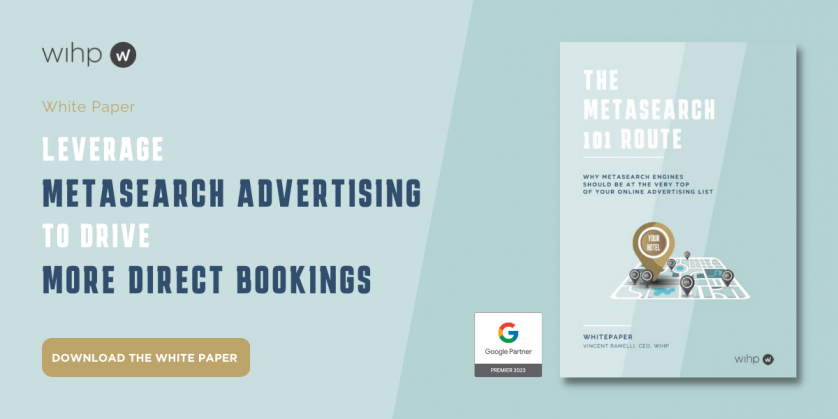
Take back control of your income with metasearch advertising
Ironically, the term “travel” comes from “travail” (“work” in French), and that kind of describes our industry entirely, as organizing a trip is a lot of work. Travel planning logistics is frustrating, and the current booking path is remarkably intricate, with hundreds of touch points down the line.
Want proof? An insightful research by Skift highlighted how some travelers look at around 150 websites before booking a hotel room. And, according to a recent Travel Agent Central study, on average, leisure travelers use 7 to 8 apps throughout their search, booking, and in-destination travel experience.
There are, in fact, hundreds of ways to book a hotel: OTAs, GDSs, Travel Agencies, phone calls, loyalty programs, members-only travel clubs, word-of-mouth, brand.com website…Anyway, we believe that some roads can get travelers to your hotel quicker. One, in particular. And that’s metasearch advertising.
From search to metasearch
First, what’s the main difference between a search engine and a metasearch engine? “Classic” search engines (such as Google, Microsoft Bing, Yahoo, etc.) send out your queries to millions of websites and, in return, offer a page (SERP) with results algorithmically ranked from most to the least relevant.
On the other hand, a metasearch engine submits queries to multiple sources and aggregates the results into a list (that’s why they are also known as “aggregators”), making the research process way more manageable.
Travelers always want the most comprehensive and complete picture possible when researching online. Still, manually comparing the results of multiple websites/apps is far too time-consuming and confusing.
Just to put things into perspective: we counted over 300 online travel agencies in operation, from Agoda to Wotif. If you add at least another 300 between wholesalers and bedbanks, it’s easy for travelers to get trapped in what American psychologist Barry Schwartz calls the “Paradox of Choice.”
That is precisely why metasearch engines, in our industry, are such a big deal. Numbers don’t lie: over 94% of travelers use metasearch engines when booking their accommodation (Eye For Travel). It’s not just a fancy way to book hotels. At this point, and with this level of fragmentation, it is necessary.
The best advertising tool for any property?
And that is why metasearch engines should be at the very top of the list when considering investing in online advertising. Effective non-branded search advertising strategies can be pretty complicated to set up, especially for smaller properties without marketing and advertising departments. And, even though these campaigns can help increase brand awareness, it’s unlikely that you will receive any last-click-booking from top-funnel, generic queries such as “Best hotel in Paris.” It is better for most hotels to focus on brand protection ads.
However, if possible, metasearch engine advertising is an even more sustainable and risk-free investment.
- First, unlike classic search engines, metasearch ads only generate an impression if your property is available for the requested dates. If your hotel is sold-out, closed, or undergoing renovation, the ad will simply not appear. So, there’s no circumstance where you may target a user who will not be able to find availability.
- Second, as metasearch engine advertising is directly connected to your booking engine’s ARI, you can dramatically reduce the clicks needed to get to the bottom funnel of the booking journey and also create a sense of urgency and scarcity, unreachable with classic search engine advertising.
Third, metasearch advertising is highly flexible. Most platforms offer multiple bidding options: cost-per-click, cost-per-acquisition, and also pay-per-stay, which allows you to only pay for the guests that actually sleep at your hotel, giving you a chance to reconcile due commissions for no-show or canceled reservations, precisely as you would do on Booking.com or Expedia. The latter approach is, therefore, and by all means, an additional distribution channel, one with lower commission costs than your average OTA.
Beyond revenue-shifting
Most metasearch engines also offer top-funnel advertising possibilities, such as Google Property Promotion Ads, Tripadvisor’s Sponsored Placements, and trivago’s Sponsored Listings. These allow properties to put their hotel in a more prominent position within the listings of the metasearch ecosystem and increase their visibility during the first stages of the booking journey.
Instead of being triggered by your hotel brand, these results appear whenever users search for accommodation at a specific destination.
It has often been debated whether metasearch engines could generate additional revenue rather than just shifting the existing demand from channels with higher acquisition costs (such as OTAs or wholesalers) to channels with lower acquisition costs (brand.com). And, if overall, these ads primarily function as a brand protection technique, the commission approach makes it evident once and for all that metasearch engines also have the power to influence the users’ decision BEFORE they start proactively searching for your brand.
For new properties or hotels that went through a significant renovation and want to rebrand themselves, metasearch engines can also work as awareness campaigns, pretty much as classic display ads do, so it’s not only about conversion.
Download our white paper
This was an excerpt of our whitepaper: learn how to leverage metasearch advertising, crucial to increase your property’s direct bookings:
- Travel is hard work
- From search to metasearch
- The best advertising tool for any property?
- Beyond revenue-shifting
- Plug&Play and granularity
- Extra benefits of metasearch advertising
- Setting the right KPIs
Conclusion
Do you want to focus on what you do best – running a hotel? We are here to help you with all your hotel digital marketing, including metasearch advertising: contact our specialists.
